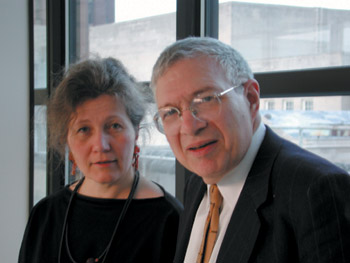 The
French connection
The
French connection
American exports to France are not
always received favorably-McDonald's restaurants, Hollywood
films, and the tentacled Americanisms that worm their way into
other languages have found cool reception by those who fear
a thinning French culture. But at least one American export,
medical ethics, has been welcomed by the French government and
medical community and may be poised to spread nationwide.

More precisely, medical ethics is a Chicago export, pioneered
in the 1970s by Mark Siegler, MD'67, the Lindy Bergman distinguished
service professor in medicine and director of the U of C's MacLean
Center for Clinical Medical Ethics. After French Minister of
Health Bernard Kouchner-a gastroenterologist who cofounded the
humanitarian organization Doctors without Borders-invited Siegler
to Paris in March 2001 to speak, the ministry decided that it
was time for French hospitals to develop clinical ethics programs
of their own.
"Ethics in France has largely been government controlled,"
says Siegler. "There are laws and regulations and national
commissions that decide things, but there is surprisingly little
of an institutional, day-to-day relationship of practice to
ethics."
To bring practical ethical training to French hospitals, Kouchner
sent Veronique Fournier, a physician and health-ministry advisor,
to train at Chicago for a year beginning last July as a MacLean
Center fellow. Since Siegler founded the center in 1984 with
the notion of "taking mid-career physicians, providing
training in clinical ethics, and sending them back to develop
programs at their home institutions," 160 fellows have
passed through its doors, sent by medical schools or hospitals
"to return and become leaders in medical ethics,"
says Siegler. More than 50 former fellows now serve as directors
or codirectors of clinical ethics programs in the U.S. and Canada.
Siegler first became interested in clinical ethics when he
directed an intensive-care unit at Chicago in the mid-1970s,
dealing daily with such issues as surrogate decision making,
euthanasia, and bed rationing. The paucity of ethics instruction
available to practicing physicians prompted him to seek guidance
from ethics scholars in the Divinity School and the Committee
on Social Thought.
"Medical ethics in the 1960s and 1970s was dominated by
theologians, philosophers, and legal scholars who were writing
about ethics as a theoretical matter," recalls Siegler.
"But for doctors and nurses who were seeing patients, ethics
was not a theoretical matter, it was a part of our everyday
practice."
Although physicians could gain ethical training through Ph.D.
programs, the process would keep them out of practice for so
long that "by the time they finished they would generally
have ended their clinical careers," says Siegler. For its
first ten years, the MacLean Center was the only place in the
country where physicians could train in clinical ethics and
then continue as physicians.
Veronique Fournier's training at Chicago is similar to that
of past fellows, but she is the first in the program to represent
a nation rather than an individual institution. "I think
that as the French government establishes a number of these
clinical-ethics programs," says Siegler, "the MacLean
Center will serve as an advisor to the programs and possibly
to the Ministry of Health."
Fournier has returned to France several times over the past
year and is spending April in Paris to prepare the country's
first medical-ethics program at the Hôpital Cochin. Siegler
will join her in France in mid-April to tour Cochin and visit
the Ministry of Health.
-C.S.

![]()
 The
French connection
The
French connection